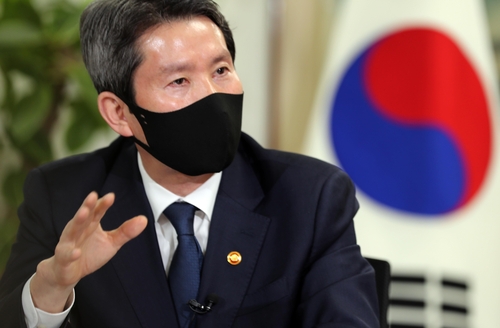SEOUL, March 23 (Yonhap) – South Korea stands ready to provide “significant” food and fertilizer aid to the North, Unification Minister Lee In-young said on Tuesday, stressing that the humanitarian exchanges will help advance the stalled peace process and advance the human rights situation in Pyongyang.
—
In a joint interview with Yonhap News Agency and Yonhap News TV, Lee also expressed hope that Washington would support Seoul’s efforts for such cross-border cooperation and urged Pyongyang to take an “open-minded” stance towards the offer of aid from the South.
—
“Peace guarantees more human rights. Humanitarian cooperation can significantly improve the human rights situation in the North. Through the exchanges, we can open the door to a greater and more natural improvement of the human rights situation in the North, ”said Lee.
—
As long as there is a social consensus and a need for humanitarian cooperation within the international community, Lee asserted that the government should not hesitate to make efforts to provide assistance “as far as our capabilities allow.”
—
“Since this year’s budget includes funds for humanitarian and livelihood cooperation in food or fertilizer, I can say that we are ready at any time to cooperate with North Korea in any way. not so small and important, ”he said.
—
Lee called for support from the United States and a change in posture from North Korea on the issue of cross-border trade in the humanitarian sector.
—
“If the United States supports our role in humanitarian cooperation, and the North does not regard it as a non-fundamental issue either and takes an open-minded position, I believe this can help create the conditions more favorable to dialogue between the North and the United States, ”he argued.
—
The chronic food shortages plaguing the hermit kingdom are well known and the shortage appears to be worsening due to fallout from last year’s floods and prolonged border controls put in place to ward off the novel coronavirus pandemic (Covid-19 ).
—
Seoul is pushing for the provision of humanitarian aid and cooperation in the public health sector, including joint efforts to tackle the spread of Covid-19, as a way to revive stalled inter-Korean relations.
—
Pyongyang rejected offers of aid, however, describing cross-border humanitarian and public health exchanges as “non-core” issues in inter-Korean relations.
—
Prospects for inter-Korean relations darkened last week when Kim Yo-jong, the powerful sister of leader Kim Jong-un, issued a harshly-worded statement criticizing South Korea for continuing its spring joint military exercises with the United States.
—
She threatened to end the inter-Korean military agreement aimed at easing tensions and dissolving the Labor Party body responsible for managing cross-border affairs and dialogue.
—
South Korea and the United States concluded their military exercises last week involving a “minimum level of troops” against a backdrop of coronavirus. Seoul also called for a “wise” and “flexible” approach so that the combined exercises do not increase cross-border tensions.
—
Lee took note that cross-border military tensions did not increase much during the combined military exercises, saying Seoul’s efforts appear to have played a role.
—
As for Kim Yo-jong’s statement, Lee expressed regret, saying Pyongyang should have understood Seoul’s goodwill effort and tried to find common ground through dialogue, not threats.
—
“There could be differences of view between the South and the North, which is why we must meet and dialogue in order to find sensible solutions,” he said. “I think we can build our future in a more positive way if we respect and keep good manners for the other and his people.”
—
Lee hoped the United States would call on the North “sooner rather than later,” saying speed was as important as direction. He also said he hoped President Joe Biden’s new US government would sufficiently reflect Seoul’s peace initiative in its ongoing North Korean policy review, which is expected to be finalized in a few weeks.
—
“Speed and direction are both important,” Lee argued. “I think it would be a positive sign if such a policy of engagement centered on diplomatic solutions (towards North Korea) materializes quickly.”
—
“It would also have a very important and positive meaning if (Washington) sufficiently expressed its support and intention to cooperate with our government’s peace process on the Korean Peninsula,” he added.
—
Nuclear talks have stalled since the 2019 summit between the two countries failed as they failed to agree on how to match Pyongyang’s denuclearization measures and Washington’s sanctions relief.
—
Lee urged Washington and Pyongyang to agree to talks even if they are not 100% full on terms.
—
“Even if they are not 100% satisfied, but only 70-80%, they have to accept discussions,” he said. “They should have a flexible and open-hearted dialogue. Getting rid of hostility can start with dialogue and end with negotiations. ”
—
Washington said earlier it had contacted North Korea for talks but Pyongyang was silent.
—
On Thursday, North Korea’s First Deputy Foreign Minister Choe Son-hui confirmed that the United States had requested talks, but stressed that the North will continue to ignore any contact unless Washington withdraws its hostile policy against it.
—
His statement came as US Secretary of State Antony Blinken and Defense Secretary Lloyd Austin were in Seoul for talks with their South Korean counterparts to discuss a coordinated strategy on North Korea.
—
Lee said Pyongyang and Washington appeared to have started to probe each other’s intentions, saying it was just the start.
—


